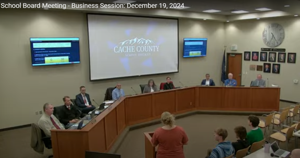
NORTH LOGAN — The Cache County School Board voted unanimously to deny an appeal to remove two books from its library shelves on Thursday night.
Earlier this year, two books were requested to be banned in the Cache County School District: I Know Why The Cagebird Sings by Maya Angelou and The Handmaids Tale by Margaret Atwood. But after two committees reviewed the books, it was determined the books did not meet the criteria to be pulled from shelves. The requesters appealed that decision, so it went to the school board.
It was the first time the school board had been through the process, due to a recent change in state law. So two committees were formed, one for each book, and hundreds of hours were spent reviewing the challenged books.
More than 20 people passionately spoke during a public comment period for and against the challenged books at the Cache County School District’s School Board meeting.
“Exposing pornography to minors is no trivial thing,” said Hillary Puertas, a parent, who said the books were not educational and should be forbidden. “They are being violated spiritually, mentally and emotionally.”
Some commenters became emotional and suggested allowing access to the books was a form of abuse. While others opined all readers have the option of closing books, if they are deemed offensive.
“These books don’t deserve to be banned just because difficult topics are brought up,” a Sky View High School student said during the public hearing. “Difficult topics have to be discussed about, because eventually the information will be lost, just like in Fahrenheit 451 where the truth is no longer accessible.”
Another parent in favor of banning the books, used her two minutes of allotted comment time to read some of the most graphic excerpts from the books out loud to the children and adults in attendance.
Several residents said they understood the desire to protect children from inappropriate content, but suggested that could be done through individual family conversations, rather than banning the books from the diverse population of students and removing the choice for all.
“When students encounter challenging topics through literature, it allows them to process difficult subjects in a safe and guided environment, rather than encountering them unprepared in real life,” said Julieann Duffin, a parent.
The committee, made up of four employees and five parents for the Angelou book and three employees and four parents for the Atwood book, spent hundreds of combined hours reading the books and evaluating the content, based on criteria defined by the state for sensitive materials.
The CCSD school board decided at a prior meeting on Dec. 5 to review the committee’s process and ensure it was done correctly and vote on it. On Thursday, the board actually voted twice. Initially, a motion was made to vote on the appeal decision and add the caveat that if the books were kept a parental permission slip would be required to be signed. After some discussion between board members to simplify the process for all involved it was voted down and a new motion was made to only vote on the decision of the committee’s decision to retain the books. That vote was unanimous. The books will stay on the shelves, for now. Board members assured a tense crowd, prior to the vote, the matter could be brought up again.
“It’s entirely possible to come back and consult about process, if there is some other legislative path people want to take,” said board member Chris Corcoran.
Up to this point, the CCSD had not dealt with a committee tasked with deciding whether or not to remove a book.
“State law recently changed who was allowed to request a reconsideration of a book; any parent within the LEA (local education agency) can now request a reconsideration,” wrote Brittany Foster, Executive Director of Teaching and Learning for the CCSD in a statement to Cache Valley Daily.
Prior to the law change, requests to challenge a book were limited to a parent, student, or teacher at the school where the book was located.
The law now requires a committee to “look at materials under objective criteria, which changed how we have to review a book,” Foster went on to say, adding that the district did not have any requests for reconsideration in many years and could not say whether or not actual reconsideration of books had ever happened before.

